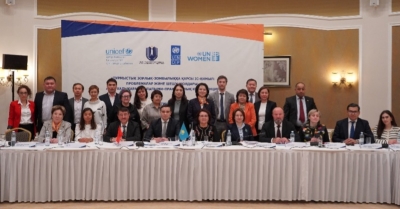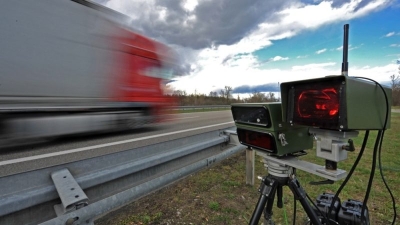Agrifood Brief: Baiting the village people

If you’re a music fan, the term ‘village people’ might bring catchy tunes and funky outfits to mind, but for EU party group(ie)s, they might be the key to winning the upcoming elections.
Farmers and other rural inhabitants have become a sought-after constituency.
That’s easy to explain: around 25% of the EU’s population lives in rural areas. Translated to the logic of political parties, this means that almost every fourth vote stands to be won – or lost – in the countryside.
This week’s assembly of the European People’s Party (EPP) in Munich left no doubt that the EU centre right has taken due notice of this statistic and included rural voters firmly into their campaigning calculations.
Meeting in the city of beer and pretzels, the currently largest EU political group in the European Parliament voted on a resolution named ‘European Farmers’ Deal’.
The title is, of course, a clear reference to the EU’s sustainability flagship strategy, the Green Deal.
But the actual deal offered to farmers by the EPP looks more like vote trading: protection from climate and environmental restrictions placed on the farming sector in return for your ballot.
In the words of the resolution adopted on Friday (5 May): “The EPP is and will continue to be the voice and defender of European farmers and our rural communities.”
In practice, this means the party promises to fight to bring down key components of the Green Deal and its food and farming branch, the Farm to Fork Strategy.
The main enemy is considered to be, above all, the fiercely fought-over pesticide reduction plans tabled by the European Commission last summer.
“We reject the proposal on the Sustainable Use of Pesticides as the reduction targets chosen are simply not feasible”, the paper reads.
The fact that the EPP is highly critical of the EU executive’s plan to slash the use and risk of pesticides in half by 2030 is not new. But it is the first time the whole party outright rejects the proposal in cold print.
Likewise, the party goes on to explicitly “reject the proposed Nature Restoration Law,” which aims to restore a large percentage of the EU’s natural ecosystems, arguing it endangers the economic viability in rural areas and food security.
Like the pesticide cuts, the Nature Restoration Law is far from popular with many farmers since both inevitably come with restrictions to their economic activity.
If, by this point, you are still in doubt whether the resolution is really a campaign brochure, the text all but spells it out when it comes to the Common Agricultural Policy (CAP), the bloc’s subsidy programme for farmers.
“Those elected in 2024 will decide the next CAP for the period after 2027,” the paper writes before going on to call for a strong CAP budget.
Read: You better vote for us if you want to keep those sweet funds flowing.
The EPP resolution deals a hard blow to the socialist Commission vice-president Frans Timmermans, who’s also tasked with implementing the Green Deal.
Speaking at a conference in Germany on Tuesday, Timmermans was keen to push back against the idea that the Farm to Fork’s sustainability policies are farmers’ nemesis.
“I am not pointing the finger at farmers. We should be farmers’ allies,” he stressed, adding that farmers themselves suffer from the impacts of the climate and biodiversity crises.
A fierce pushback against the EPP’s stance also came from the Greens, with Franco-German MEP Anna Deparnay-Grunenberg accusing the centre-right’s ‘new hardliner policy’ of ‘killing’ the Green Deal, while Austrian Sarah Wiener called the resolution ‘irresponsible towards farmers’.
Pushback or not pushback, the courtship of rural votes is here to stay.
In fact, the EPP’s charm offensive to farmers has not been the only one in recent weeks: In Spain, as our Paula Andrés reported, the irrigation issue has been at the heart of a battle for rural votes.
In Germany, the upcoming regional elections in farming-heavy Bavaria mean parties – especially EPP member CSU – have been soft-soaping farmers left and right.
“Farmers and foresters are the true climate activists, and no one else,” said Bavarian agriculture minister Michaela Kaniber (CSU), for instance, said at an event in Brussels this week while also speaking out against pesticide cuts and nature restoration.
And last but not least, the Polish ruling party’s scramble for rural voters has been a driving force in the back and forth around banning and unbanning the import of Ukrainian grain.
From Brussels, it can be easy to forget about rural areas. After all, as little as 2% of Belgians live in the countryside.
But as multiple elections approach throughout Europe, never underestimate the power of rural voters.
Agrifood Podcast: Both sides of the import ban story

Agrifood Podcast: Both sides of the import ban story
This week, EURACTIV’s Natasha Foote explores the fallout of the unilateral decision of frontline EU countries to ban agricultural imports from Ukraine.
Agri-bites
What to watch in the plenary. In a debate on Monday (8 May) and a vote on Tuesday (9 May), MEPs are expected to ask to improve the uptake and functioning of the EU school scheme for fruit, vegetables and milk. On Wednesday (9 May), MEPs will debate the role of farmers in the green transition and how to help the agriculture sector more effectively. On Thursday (10 May), MEPs will adopt their negotiating position on a directive to improve product labelling, make products last longer and end misleading claims.
Acute food insecurity rose to 258 million in 58 countries in 2022. The number of people experiencing acute food insecurity and requiring urgent food, nutrition and livelihood assistance increased for the fourth consecutive year in 2022, with over a quarter of a billion facing acute hunger and people in seven countries on the brink of starvation, according to the latest Global Report on Food Crises report.
World food prices have risen for the first time in a year. The latest FAO Food Price Index, which tracks monthly changes in the international prices of commonly-traded food commodities, averaged 127.2 points in April 2023, up 0.6% from March amid higher international quotations for sugar, meat and rice, while prices for wheat, maize, dairy products and vegetable oils decline.
Suspension of tariffs and quotas on imports from Moldova. The Commission has proposed to renew and expand the suspension of import duties and quotas on Moldovan exports to the EU – known as Autonomous Trade Measures (ATMs) – for another year. The proposal includes an expedited safeguard mechanism to help tackle EU agricultural sector concerns.
New geographical indication. The Commission approved the addition of ‘De Voerendaalse Bergen’ wines from the Netherlands to the Register of Protected Designations of Origin (PDO) this week.
Geographical indication for non-food. Council and European Parliament reached a provisional agreement this week to extend protected geographical indications to craft and industrial products – such as jewellery, textiles, glass, porcelain, etc – “whose qualities are essentially linked to the area of production.” This includes, for example, Bohemian glass, Limoges porcelain or Solingen cutlery. The regulation aims at promoting and protecting traditional ‘know-how.’
Calculate your food print. Interested in discovering how what you eat affects the planet? With a new interactive calculator designed by the environmental NGO WWF, you can find out about the impact of your diet on the climate, biodiversity, and human health depending on where you live and what you eat.
Agrifood news from the CAPitals
SLOVAKIA
Slovak agriculture minister resigns after EU funds controversy. Acting Agriculture Minister Samuel Vlčan resigned on Thursday after his company received an EU funds grant worth €1.4 million – money he insists on keeping. Read more. (Michal Hudec I EURACTIV.sk)
NETHERLANDS
Commission greenlights Dutch plans to buy out nitrogen polluters. The European Commission has approved two buy-out schemes worth €1.47 billion proposed by the Dutch government last year to buy out especially polluting farms in an effort to cut the country’s nitrogen emissions in line with EU commitments. Find out more. (Benedikt Stöckel I EURACTIV.com)
BULGARIA
Bulgaria to lift ban on Ukrainian imports. The national ban Bulgaria imposed on certain goods coming from Ukraine will be lifted once the EU’s market stabilisation measures agreed to at the end of April come into force, the cabinet’s press service announced Wednesday. Read the full story. (Krassen Nikolov I EURACTIV.bg)
GERMANY
Minister slams Commission over grain saga handling. German Agriculture Minister Cem Özdemir has criticised the European Commission’s handling of the crisis surrounding the influx of Ukrainian grain in Eastern European countries, as well as the unilateral import bans imposed by several of the affected countries. “The headstrong border closures on the one hand, but also the less than transparent approach of the EU Commission on the other, have left scratches,” the Green politician said in a statement issued after an agreement was found with the countries in question. However, Özdemir welcomed the lifting of import bans. (Julia Dahm I EURACTIV.de)
SPAIN
Government defends prohibition to mix vegetable oils. Spanish Agriculture ministry has stood by the small farmers association (UPA) after they denounced olive oil mixed with sunflower oil being sold in Spanish supermarkets. Despite Spanish law prohibiting the practice to preserve the quality and reputation of olive oil, other member states and EU rules allow it – making it possible for these mixed oils to arrive in the Spanish market. Producers ask for an EU-wide prohibition to avoid a competitive disadvantage of Spanish olive oil. The government, for now, advises the consumer to “pay attention to the label to know if it is a mixture.” EFEAgro has more.
LUXEMBOURG
Minister defends slow organic farming progress. Luxembourg is already doing everything it can to boost the share of organic farming in the country, Agriculture Minister Claude Haagen said in an interview with the newspaper Tageblatt on Tuesday. Asked why, with only 7% of agricultural land farmed organically, the country is still far from the goal of 20% by 2025 set by the government, Haagen pointed to lacking demand. “The consumer is not yet 100% on this path,” he said. At the same time, he stressed, Luxembourg is “one of the European countries with the highest subsidies” to support organic farming. (Julia Dahm I EURACTIV.de)
AUSTRIA
Working standards for farm workers. With a set of new regulations, the Austrian government aims to set national minimum standards for the working and living conditions of agricultural workers. With the regulations, which are set to enter into force on 1 June, the various regional rules are consolidated into a standardised national framework for the first time. “In agricultural and forestry enterprises with branches across federal states, legal certainty and fair competitive conditions will finally prevail due to the uniform regulations,” Andreas Freistetter, president of the Austrian rural workers’ council, said. (Julia Dahm I EURACTIV.de)
Events
6 May I Various food-related activities on offer at the European Commission Open Day
8 May | SCA meeting
8 May | Wikifarmer online event on new breeding techniques
Read more with EURACTIV




